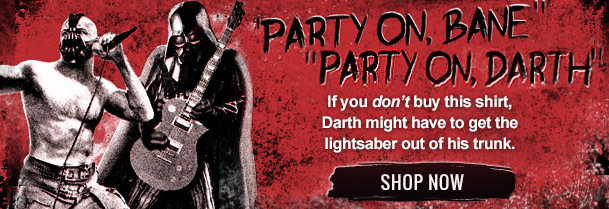The 4 Most Insane Overreactions to Bad Online Reviews

Whether you're a small-business owner, a freelancer, or someone who makes Cthulhu figures out of 1980s My Little Ponies, you can count on one thing: at some point, people will get online and say that your product sucks a finite amount of balls.

"Ph'nglui mglw'nafh ONE AND A HALF STARS Cthulhu wgah'nagl."
Sometimes people write these bad reviews for dumb reasons. Hell, I wrote a whole book about the stupid reviews people leave online. But it's generally agreed that unless a reviewer is actually threatening to burn your business to the ground because he didn't like the tentacle-work you did on the pony's mane, business owners and creators should react to bad online reviews with cold, dead silence ... not by going as crazy as turd stir-fry. Because that's when we get stuff like ...
Threatening Big-Ass Lawsuits

Here's something you might not know about review sites like Yelp and Angie's List: under a neat little trick of U.S. law, these websites can't be sued by businesses if someone uses them to leave a bad review, but the individual reviewers can. This means the two-page complaint you just typed about the human finger you found in your Pad Thai could potentially lead to you getting sued.

"What does 'human' really mean these days, anyway?"
Obviously, if a reviewer makes up a story about human fingers in food because she didn't approve of the waitress' hairstyle, the restaurant has a right to take action. That's what defamation laws are for. But some recent threats against reviewers have moved way beyond "dealing with crazy liars" and well into "fuck anyone who doesn't like us" territory. One example is so-called "non-disparagement" clauses. You know those long "terms of sale" agreements on websites that no one actually reads because there's a whole goddamn Internet out there to look at instead? You can just shove a sentence or two in there about how the customer is not allowed to complain online, and boom! You're bad-review proof!
In 2012, a couple in Utah experienced this personally: citing a non-disparagement clause, online gadget store KlearGear threatened them with a $3,500 fine if they didn't take down a bad review they'd written about the store four years earlier. The review site wouldn't allow them to take it down, and so KlearGear graciously reported the pair to a collection agency. The couple ended up losing heat for several weeks in their house because of their damaged credit score. Which is exactly the kind of "we're evil; don't fuck with us" public image a business strives for but so rarely achieves.

Keep this in mind next time you impatiently rush through the terms and conditions of ExtraLargeDildos.com.
California recently passed a law prohibiting companies from enforcing these stupid clauses, but that's just one state, and that leaves at least, like, 12 to go. And if you're currently shaking your head about lawsuit-happy Americans, note that in the United Kingdom an author recently reacted to a negative Amazon review by taking both the reviewer and Amazon to court, where the reviewer was forced to represent himself because he couldn't afford a lawyer. The case was thrown out only after Amazon paid out 77,000 pounds in legal fees, so if you live in the U.K. and you're poised to write a one-star review of Guide to Bees because "it didn't have enough bees in it," maybe hold off until your bank account balance is looking better.
Writing Book-Length Rebuttals

Many of us have written a negative book review or two in our time. What else were you supposed to do after the author of Buxom Space Vampires Attack! killed off all the buxom space vampires in Chapter 3 and devoted the rest of the book to the two surviving characters discussing objectivism? For the most part, though, authors graciously ignore all this negative feedback, or at least pretend to ignore it while channeling all their rage into a stress ball they're imagining as your genitals.

"IT'S CALLED AN UNRELIABLE NARRATOR! I DON'T PERSONALLY THINK THAT
MURDER IS OK AND THAT DOGS ARE STUPID!"
But not all of them. For example, there's Candace Sams, a romance author who responded to a one-star Amazon review with a barrage of posts that exploded into a 41-page flame war in which Sams eventually threatened to report everyone in the thread to the FBI.
Then there's the author who attacked a book-review site that wrote a "meh" review of her first novel, complaining that reviewers should get permission from authors before they write anything bad about books online. That confrontation ended with the author repeatedly yelling "FUCK OFF" at everyone in the site's comment section, which is the sort of online behavior we don't usually see until someone brings up whether or not atheism is a religion on Facebook.
And it's not just little-known writers. Anne Rice, the Vampire Chronicles author who otherwise seems like a really nice person, can get a bit strange when it comes to bad reviews. Rice has used her own site to publicly accuse negative Amazon reviewers of "slander" and of using the site as "a public urinal to publish falsehood and lies."

To be fair, that description does accurately represent a good 65 percent of the Internet.
It's always difficult to hold back when someone is attacking you online. Luckily, I have a Cracked editor who follows me around and deletes my comments whenever I challenge that one negative commenter to a flame-thrower duel (you know who you are!), but not everyone can afford that. The thing is, when it's a popular author who's throwing an online tantrum, the effects are much worse than when it's a random Internet person. To many book-lovers, authors are practically supernatural beings: they're not immediately present in our lives, but they're capable of creating entire worlds that we love and escape to. If an author we admire shows up in a review section and reveals themselves to be the same type of petty, ego-driven ass as everyone else, it's like a statue of Jesus came to life, pulled up his robes and gave us the finger.
Trying to Ruin the Reviewer's Life

Angry rants are annoying, but at least you can walk away from them. Other reviewees ride their horses of rage further into the fields of excess and devote themselves to personally bringing down the person who said something bad about them on the Internet. Take Marisol Simoes, who in 2009 received a bad online review for her Ottawa restaurant. According to the review, the restaurant charged a woman twice for the same meal after she returned the dish to the kitchen because it contained olives and she'd requested that they be left out.

Above: the dish in question.
Simoes, showing Vulcan-like levels of restraint and deduction, decided on a clear, logical next step: she composed a fake email under the customer's real name declaring an interest in perverted group sex, and sent this email to 75 of the woman's co-workers. She also posted the poor woman's name to a dating site with similar requests. This olive-based vendetta continued for two years and ended with Simoes being prosecuted under a rarely used criminal defamation statute and sentenced to 90 days in jail to contemplate her life choices.
Then there's sommelier Krunch Kretschmar, who received a one-star Yelp review after a potential customer lost her place in his wine-pairing class. Krunch, perhaps after deciding that the evening's wine was best paired with going completely fucking insane, reacted to this single bad review by allegedly starting a fake blog in the reviewer's name, in which she "confessed" to embezzling from her employers, taking drugs, and engaging in prostitution. Another lawsuit ensued.

"Joke's on them. I'll just make a fake blog about the judge's illegal pig-fighting ring."
As crazily as these people acted, though, at least they were defending their own businesses. The world is also full of people eager to do battle with reviewers on behalf of someone else's product. There are the people who started an online petition to get a video game reviewer fired after she dared to give GTA V the shockingly low score of 9 out of 10. Or the Batman fans who decided that a good reaction to the The Dark Knight Rises' sole early bad review was to flood the reviewer with death threats.

"There is no way anything like this could possibly backfire!"
The response to the review was so bad that Rotten Tomatoes shut down all comments on Dark Knight Rises reviews, even though the reviewer claimed he wouldn't worry too much until someone actually showed up on his front step in response to a bad review. But you can rest assured that no one is crazy enough to ever do that, and we can all hold on to that assumption by not letting our eyes move down slightly to read the line below this one, and ...
Showing Up on the Reviewer's Front Step

Yeah, you knew this was coming. In 2013, YA author Kathleen Hale came across a Goodreads review written by a woman who didn't like her latest book. The reviewer also apparently made fun of Hale on Twitter, which for most authors would necessitate at least an extra 20 minutes or so with their stress ball. What it probably didn't necessitate was what Hale did next: she tracked down the reviewer's real name and address, obsessively monitored her social media accounts, and then showed up at her goddamn house, before finally having a moment of self-reflection and turning around when she reached the poor woman's doorstep. And thank God for that, because some types of conversations should definitely stay online, safely away from a jail cell or a morgue.

"Susan, I am simply requesting that you provide evidence backing up your fallacious opinions
instead of resorting to ad hominem attacks."
Say what you will about Hale: at least she turned back. That's a lot better than the alleged reaction of author Richard Brittain to another Goodreads opinion. After a young female reviewer wrote a long, negative review of his self-published novel, The World Rose, Brittain sent her a polite message and the two agreed to disagree. Wait, no, he allegedly tracked her down via her Facebook page, traveled all the way from London to the town in Scotland where she lived, and then hit her over the head with a wine bottle.
Fortunately, the woman was OK after receiving medical treatment, but she did report what had happened to her both to the police and to Goodreads. Other Goodreads readers have since barraged Brittain's book with one-star reviews, and its ratings have slipped lower than ever, so the lesson here is -- wait, do authors really need lessons about not hitting strangers over the head with wine bottles? Oh well, just in case. Authors, don't hit people over the head with wine bottles.

"'What do we say to the God of Hitting People Over the Head With Wine Bottles?' Darn, what was the answer to that one?"
C. Coville's book about funny bad reviews, One-Star Reviews, is now available for preorder at Amazon and Barnes and Noble. You should probably buy it.
And be sure to check out 5 Ways You Didn't Realize the English Language Is Defective and 5 Awesome Things With Inexplicably Bad Reputations.
